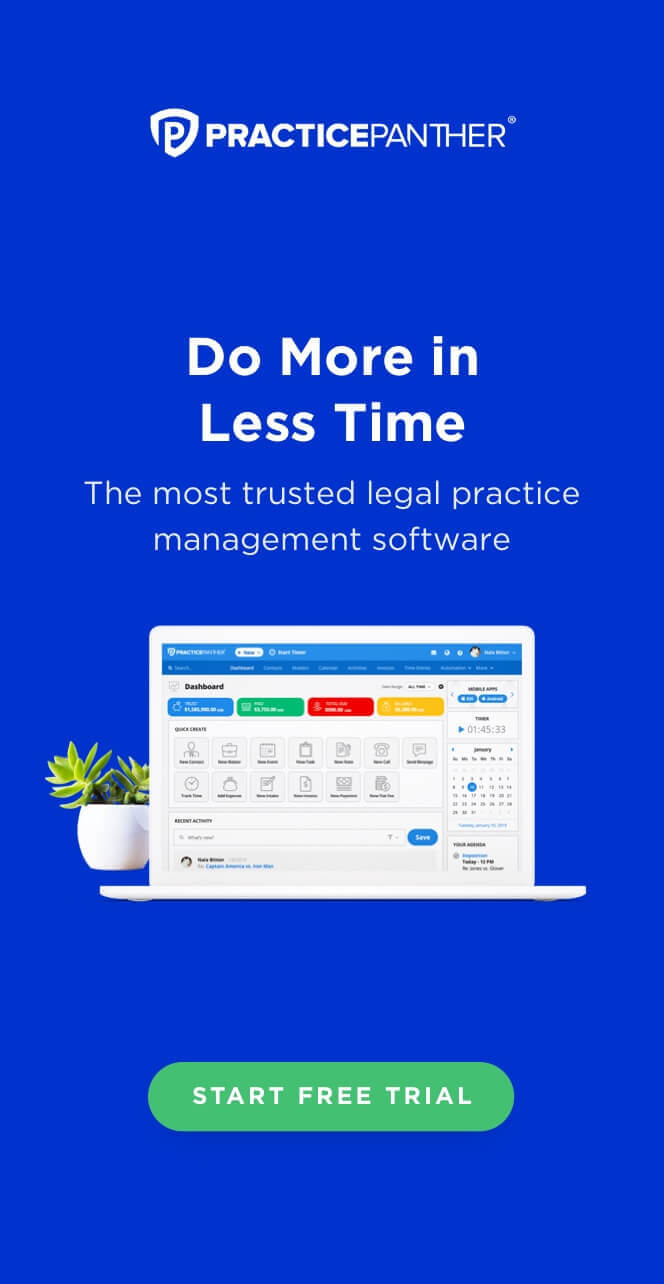As a whole, the legal industry is traditional and adverse to change. Legal technology was injected into the day-to-day of many law firms mostly due to the pandemic. With looming hesitation and lack of familiarity, it’s understandable that law practice management software myths began to pop up in the legal industry.
From negotiations and court hearings on Zoom to secure email and text communications with clients from home, lawyers got on board with technology. Along with the tools that helped them overcome the challenges of the pandemic, they realized benefits like legal analytics for decision making, automation for repeatable processes, and secure billing and invoicing.
Still, some law firms are slow to make the leap into legal technology for many reasons, including enduring myths about the capabilities and risks of leveraging these solutions.
What Is Law Practice Management Software?
Law practice management software is a catalyst for legal professionals seeking enhanced efficiency and precision in their daily operations. It leverages innovative technologies like artificial intelligence and blockchain to streamline tasks, manage client records, and ensure compliance.
As with all progress in technology, there are certain fears and myths that arise. Here are the top five myths surrounding practice management software that you should be aware of:
Myth 1: Legal Technology Is Difficult to Understand
It’s true, technology used to be reserved for tech-minded people. People without a background in computer science or IT would be lost. Things have come a long way, however.
Now, technology solutions cater to the business user – in this case, lawyers and legal staff – and offer intuitive interfaces. While some capabilities benefit from the know-how of an IT professional or team, the average business user can learn to manage the tools and operate the software using the instructions from the provider.
Myth 2: The Law Is Too Complex for Law Practice Management Software
Despite concerns, legal technology was never intended to replace lawyers or legal staff – it’s used to improve efficiency and accuracy. In essence, it takes on the burden of mundane tasks to save time, reduce errors, and streamline processes.
The work that only lawyers and legal staff can do is still left to them. Law practice management software merely addresses the time-consuming and repeatable tasks like automating client intake forms, applying one-click templates, and integrating with common software solutions like DropBox, OneDrive, and Google Drive.
Law practice management software also reduces errors with tools for timekeeping and scheduling. Court deadlines and rule sets can be imported to the calendar to ensure deadlines and events are organized and scheduled. It also helps with automatic payment reminders, client-specific payment plans, and on-retainer contracts.
Myth 3: Technology Leaves Sensitive Firm and Client Data at Risk
The legal industry deals with a lot of sensitive and confidential information for law firms and clients. A breach could be devastating, not only to the law firm’s brand but to the clients whose information was leaked.
With this in mind, many lawyers prefer to do everything manually, especially when it comes to client billing and other sensitive details. This takes a lot of time, however, and could lead to errors that also put the firm’s reputation at risk.
Like many other software solutions, legal practice management software operates on cloud technology. Not all providers offer the same level of security, but a reputable one will keep that data safe with HIPAA-compliant legal software, military-grade encryptions, and access control.
Additional security features may include two-step authentication, limited access for certain users or features within the software, and data backup. Information is not only protected from hackers and other bad actors, but it’s protected from unauthorized access and loss or damage during migration, power outages, and more.
Myth 4: Technology Is for Big Law Firms
Technology may seem like a big investment reserved only for large firms, but that couldn’t be further from the truth. While yes, many of the tools that come with practice management solutions are designed to serve the needs of medium and large firms, this software offers plenty of benefits for small and solo firms.
Plenty of software providers offer tiered subscription plans as well, giving law firms the option to choose the most cost-effective option. This is ideal for solo and small firms, especially if they’re just starting out. Then, as the firm grows, it can upgrade to the next tier to gain new features and functionality.
If the financial investment is a concern, a trial is always a smart choice. Law firms can gauge the value of the software and see if it pays off in time or money saved.
Myth 5: Technology Is a One-Size-Fits-All Solution
With multiple software providers on the market, it may seem like practice management solutions offer the same solutions. Depending on a firm’s practice area, some tools will go unused, and others will be sorely needed.
Legal practice management solutions aren’t one-size-fits-all, however. Providers offer a range of customizable tools and functionality to tailor to the firm’s specific needs, as well as specific features designed to cater to the demands of different practice areas.
While some aspects of the law are similar across practice areas, others require a customized approach. These tailored software solutions help lawyers with the most burdensome aspects of their work.
For example, some lawyers rarely get repeat clients, while others work on retainer and need advanced client management solutions. Some firms work on transactional flat fees, while others bill by the hour. All of these specifics matter when it comes to tailoring a software solution.
Furthermore, these practice areas tend to have different clientele with different marketing needs. C-suite executives are searching for corporate attorneys on different channels than someone looking for a divorce attorney or an immigration attorney.
Law Practice Management Myths Shouldn’t Hinder Law Firm’s Growth
Historically, the legal industry is resistant to change and innovation. There was little need to update and upgrade systems and processes if the way things have been done works. That’s no longer the case in the post-COVID world, however, especially with an influx of new, young lawyers who embrace the possibilities of technology.
Persistent myths hamper innovation for law firms, but with an understanding of what this technology can do to make a firm more efficient and profitable, law firms can find the right law practice management solutions to amplify their capabilities.






